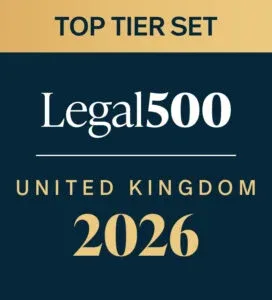When its Not Appropriate For a Local Authority to Make a COP DOL 11 Application Under the Streamlined Procedure
Added in: Court of Protection
In the recently decided case of JDO (authorisation of deprivation of liberty) [2019] EWCOP, judgement was handed down by Her Honour Judge Hilder in respect of whether a local authority had provided full and frank disclosure in respect of it’s COP DOL 11 application. This application having been made under the Court of Protection’s streamlined procedure to authorise P’s deprivation of liberty and infringement of his Article 5 Convention Rights. In this case P was a 24 years old male and his mother and father were respondents. P had not lived with them since the age of 11 but they continued to visit him and were significantly involved in his life.
P has a diagnoses of cerebral palsy, autism, learning disability and epilepsy, and his behaviour could be challenging. Since May 2017 P had been living and receiving care at a supported living placement. This being a one bedroom flat of which he had exclusive occupation. His care arrangements included eight hours a day of one to one carer support plus eight additional hours a month of two to one carer support. The latter enabled family contact to take place. P shared wake in night staff with the residents of other flats in the block. Latterly, following incidents when police assistance was required, P also required two to one carer support when accessing the community. There remain ongoing proceedings in the Queen’s Bench Division in which P is the claimant in a claim for clinical negligence. The Official Solicitor acts as P’s litigation friend in those proceedings. None of the parties disputed that P was deprived of his liberty at his placement as per the Supreme Court’s judgement in Cheshire West. However his parents raised concerns as early as the initial best interests meeting in relation to his placement and then more latterly as to whether he was happy residing therein.
HHJ Hilder held that the local authority’s application which had been made under the streamlined procedure as set out in Part 2 of Practice Direction 11 was not the correct procedure to be used in this case.
The Local Authority had applied under the streamlined procedure for continuing deprivation of P’s liberty despite concerns being raised by P's parents as early as the initial best interests meeting in 2018. The court held that the duty of the applicant local authority is to make ‘a full and fair disclosure of all the material facts'. If a person sensibly within the categories of person who ought to be consulted holds a view which is contrary to the applicant local authority’s view. The court held that the applicant local authority must make that clear in it’s application, irrespective of its own view of the merits of any opposing view. A local authority cannot simply dismiss the objection to a placement on the grounds that there are no alternative options and hence the only available option is in P’s best interests.
The Local Authority Barnet Council did not, in the view of the court, make it clear in the form COPDOL11 that the parents opposed the application. The court held that the application should accordingly not have been brought under the streamlined procedure because there were contentious issues as early as the initial best interests meeting when the parents expressed reservations about the placement. It was further held that the case should have been brought by way of a COP 1 application as a contested welfare matter. The COP DOL 11 route not being the appropriate route for such applications.
In the recent case of Lincolnshire County Council v AB [2019] EWCOP 43. Mr Justice Keehan sitting in the Court of Protection in his ex tempore judgement agreed with the local authority’s approach in not assisting or facilitating a person in receipt of services to have contact with sex workers either in here in the UK or Holland.
Lincolnshire County Council brought this welfare application in relation to a 51 year old male who has diagnoses of a moderate learning disability, autistic spectrum disorder together with a history of alcohol misuse and psychosis. P had a chaotic and difficult childhood attending various boarding schools and was detained initially under the Mental Health Act 1983 in 1985. There then followed another 10 admissions up until 2003 when he was detained under section 3 Mental Health Act 1983. The last admission under section 3 being for a period of some 7 years. Upon his discharge from hospital P moved to a community placement and met a local prostitute whom he began a friendship with. P developed a fascination with sex workers and would on occasion travel to Holland to visit such workers. The local authority made a welfare application for orders in respect of P’s capacity and best interests in terms of his contact with sex workers.
Expert evidence was obtained from Dr Rippon who concluded that P lacked capacity in respect of contact specifically with sex workers although he retained capacity in terms of sexual relations. Dr Rippon said in evidence that:
“P has limited insight into the risks that others might pose to him, including sex workers and overestimated his ability to keep himself safe. He could not think through the potential consequences of visiting sex workers, including the possibility of financial exploitation or involvement with the criminal justice system. I believe that P failed to both understand the information necessary to make decisions about contact and was unable to weigh up the benefits and risks. It is therefore my opinion, that P lacks capacity in this area and this is as a result of his learning disability and autism”
The local authority did not intend to facilitate P’s access to sex workers either in the UK or Holland. The court agreed with the local authority and Mr Justice Keehan held that the local authority had adopted the right decision and approach in not seeking to facilitate P's contact with sex workers either here or abroad.
Mr Justice Keehan also said in his judgment that:
“…I note that a care worker who causes or incites sexual activity by an individual for payment, with another person, commits a criminal offence, pursuant to ss. 39,42 and 53A of the Sexual Offences Act 2003.”
As such any care worker who looked after and supported P and were to assist him in facilitating any visit to sex workers would be committing a criminal offence. A declaration by the Court of Protection would not in such an instance prevent any prosecution. His lordship Mr Justice Keehan also held that:
“In the Netherlands, of course, prostitution and payment for sexual services are not illegal, But in my judgment, there is a very real risk that if a care worker here, supporting P, made arrangements for him to travel to the Netherlands for the purposes of having sexual activity with a woman for payment, they would be at risk of being prosecuted for a breach of the Sexual Offences Act 2003.”
The court having held that it was wholly contrary to P's best interests for him to have sexual relations with prostitutes. Still less, was it appropriate for the court to sanction the same. As such the Court has assisted in clarifying this sensitive issue for local authorities when they are approached by persons in receipt of services with such requests.
NHS Digital who provide statistics across the NHS in England have reported that the number of Deprivation of Liberty Safeguards applications received for the year 2018-2019 totalled 240,455 in England across all local authorities. Of the DOLS applications received 216,005 we completed. This is an increase of more than 42% on the 151,970 applications completed only 2 years ago. There however remained across England some 131,350 uncompleted DOLS applications which represents an ever increasing total. As the number of completed applications fails to meet the number of applications received in each year. A positive for DOLS supervisory bodies is that whilst over half of all DOLS applications remained uncompleted at the year end following the Supreme Court’s Judgment in 2014/15. This has now fallen to just over 10% of all applications being uncompleted at year end in 2018/2019.
Local Authorities are no doubt improving in terms of their management of the DOLS however with the Liberty Protection Safeguards already on the statute book via the Mental Capacity Amendment Act 2019, and due to come into force in October 2020. There remain significant challenges ahead with it is reported in a recent survey 82% of adult social services directors having no or only partial confidence that they can deliver their statutory duties in relation to the Liberty Protection Safeguards from next year.
The Liberty Protection Safeguards (“LPS”) establishes a process for authorising arrangements enabling care or treatment which give rise to a deprivation of liberty within the meaning of Article 5(1) of the European Convention on Human Rights (ECHR). This being where the person lacks capacity to consent to the arrangements. It further provides for safeguards to persons subject to the regime.
Will there be a transitionary period?
As there are no transitionary regulations to accompany the Mental Capacity Amendment Act 2019 this is an entirely unknown at this stage. It is a widely held view that there is likely to be a period of perhaps a year where the DOLS runs alongside the LPS. This will allow for a transfer of those subject to an extant DOLS authorisation to transfer to LPS in an orderly way.
What are the problems with the LPS?
The LPS represent a number of issues for local authorities firstly their scope is much wider than the current DOLS, as the LPS statutory authorisation scheme will also encompass both supported living and care arrangements in a person’s home. The LPS also apply to 16 and 17 year olds as well as those persons over the age of 18.
In terms of advantages to the new scheme whilst these are yet to be seen there are potentially some firstly a proposed more streamlined process for authorising deprivations of liberty. In addition the responsibility for managing cases as the supervisory body will be divided between local authorities and clinical commissioning groups. With CCG’s becoming the supervisory body for persons in receipt of NHS continuing healthcare. There will also be significant extra duties for care home managers to take responsibility for assessments. How this will play out remains to be seen and whilst the rationale behind the new statutory scheme which provides for greater responsibility on care home managers to manage assessments, is to reduce the burden on local authorities. The reality may well be that local authorities spend more time assisting care home managers to understand and implement the new LPS.
There is also the issue of the new approved mental capacity professional role (AMCP), whose primary role will be to review certain cases to ensure the statutory conditions to authorise any deprivation of liberty are met. Best interest assessors will be replaced by AMCP’s and local authorities will need to ensure that teams of AMCP’s are established and provided with the requisite training.
Will there be a delay?
The current administration passed the Mental Capacity Amendment Act 2019 earlier this year. The LPS being due to come into force on October 2020. However whilst the legislation provides for a Code of Practice to support the Act. There remains to date little sign or development of the necessary Code. Without development of the Code of Practice which would need to be developed by the Department of Health and Social Care in conjunction with the Ministry of Justice. It would seem that the commencement of the LPS will in all likelihood be delayed beyond October 2020. It remains unclear until when but a delay of 6 or perhaps 12 months seems likely in terms of any implementation date.









